1970s
Eight Minutes of 1979 Commercials
Talking dogs, dancing housewives, magical cleansers--plainly, we were all insane.
Posted By: Paul - Sat Sep 30, 2017 -
Comments (3)
Category: Advertising, Products, 1970s
Naked Chicken Research
1976: Drs. William Johnson and Robert Truax of Louisiana State University raised and studied featherless chickens."I guess 'embarrassed' is as good a word for it as any. You put one of them in with a flock of normal birds, and it huddles off in a corner by itself. The other birds won't have anything to do with it until they get used to it," he said.
"And then they're just not as active sexually. They will court and strut much more than the normal bird, but they don't mate as readily."
The story reminds me of the old urban legend about KFC raising mutant, featherless chickens. Maybe this is where the story started.

Argus Leader - Aug 31, 1976
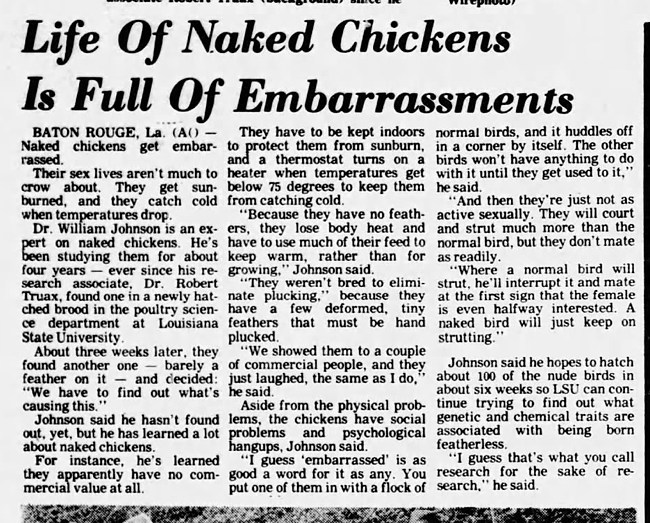
Salisbury Daily Times - Aug 31, 1976
Posted By: Alex - Fri Sep 29, 2017 -
Comments (4)
Category: Animals, Science, Psychology, 1970s
The Love Machine
Created in the late 1960s by Hollywood auto customizer George Barris, who's best known as the designer of the original Batmobile.The Love Machine featured velvet upholstery, a revolving circular bed, psychedelic lights, entertainment console, mirrored ceiling, and a crystal chandelier. It did the rounds at auto shows until the mid-1970s, where it was promoted as the "world's first x-rated car."
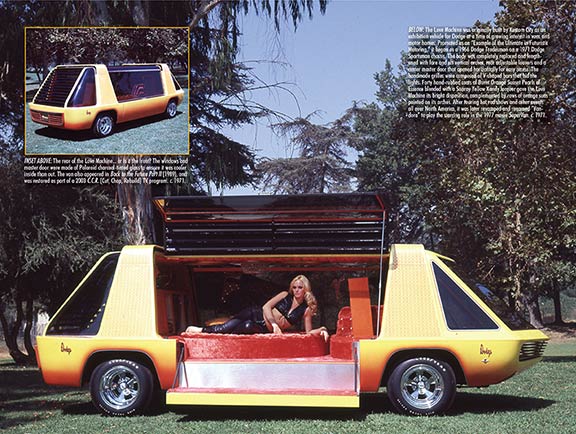
via lastgasp.com

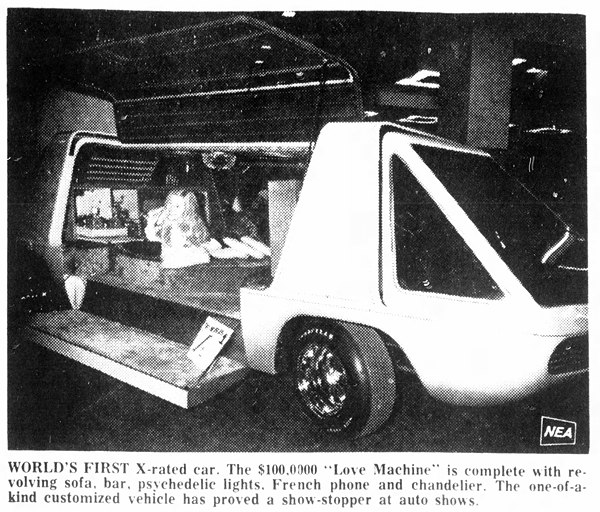
Hillsdale Daily News - Mar 17, 1972
In the late '70s, the Love Machine was rebranded and it went on to have a career in Hollywood. From Hemmings Daily:
Nor would SuperVan be the van’s only screen appearance. It also showed up in the 1986 made-for-TV movie Condor, repainted gold and black; then in 1989’s Back to the Future II as a Hill Valley Transit bus, painted green; in the 1990 movie Solar Crisis, painted white; and then on an episode of the 1990s TV show SeaQuest DSV, still painted white. Then, in about 2003, the Guild of Automotive Restorers began a restoration on the van that brought it back to its Super Van configuration.

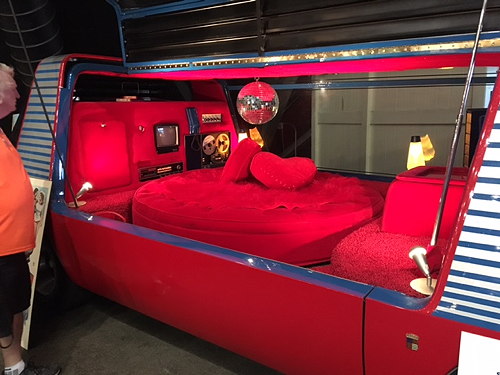
via vanning.com
You can check out more of Barris's creations in the recent book King of the Kustomizers: The Art of George Barris.

Posted By: Alex - Tue Sep 26, 2017 -
Comments (5)
Category: Motor Vehicles, Bus, 1970s
The Exploding Recipe
May 1978: Random House issued a recall of a cookbook, Woman's Day Crockery Cuisine, after realizing that one of the recipes "could cause a serious explosion."The recipe in question was for "Silky Caramel Slices." The problem was that it instructed people to heat an unopened can of condensed milk in a crockpot for four hours. A statement from Random House noted, "If the recipe is followed, the condensed milk can could explode and shatter the lid and liner of the crockery cooker."
What the recipe neglected to mention was that you should add water into the crockpot surrounding the can. Initially I thought you should open the can also, but my wife (who's heard of this technique of cooking condensed milk on a stove top) corrected me. You keep the can closed so that the milk doesn't boil out of the can.
Marilynn Marter, writing in the Chicago Tribune (May 25, 1978) explains:
The conditions that have made this underground recipe successful and therefore popular, especially with children, are water and temperature. By being heated in boiling water, the temperature of the can and milk do not exceed the boiling point. After a few hours of this, the sugared milk turns to a caramel pudding. In the Crockpot, however, especially without water, the temperature can build up rather like a pressure cooker. That was the most immediate cause of the problem.
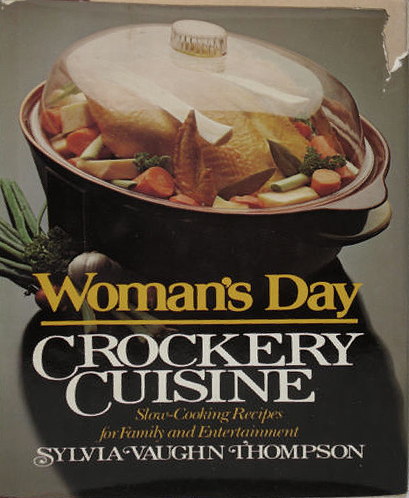
Front Cover
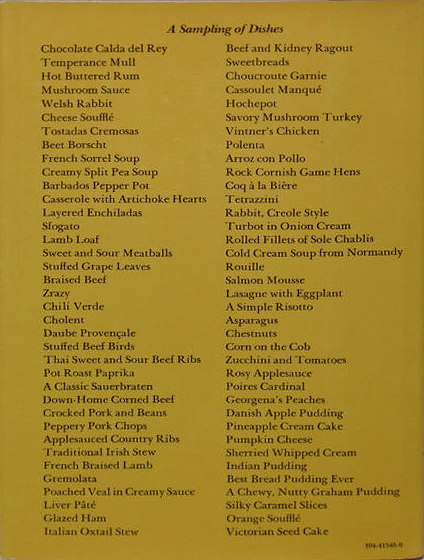
Back cover
The 'exploding' recipe (Silky Caramel Slices) is listed third from bottom, right-hand column.

The Tennessean - May 9, 1978
Posted By: Alex - Thu Sep 21, 2017 -
Comments (3)
Category: Food, Cookbooks, 1970s, Weapons
Wraparound Headphones
The Jecklin Float electrostatic headphones. They were non-adjustable. So they either fit, or they didn't. But apparently the sound quality was pretty good.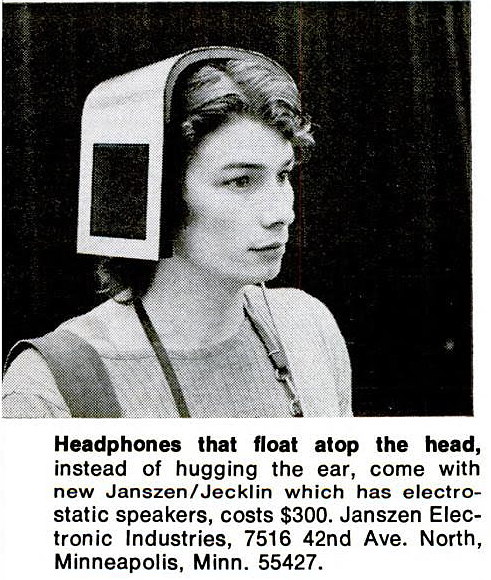
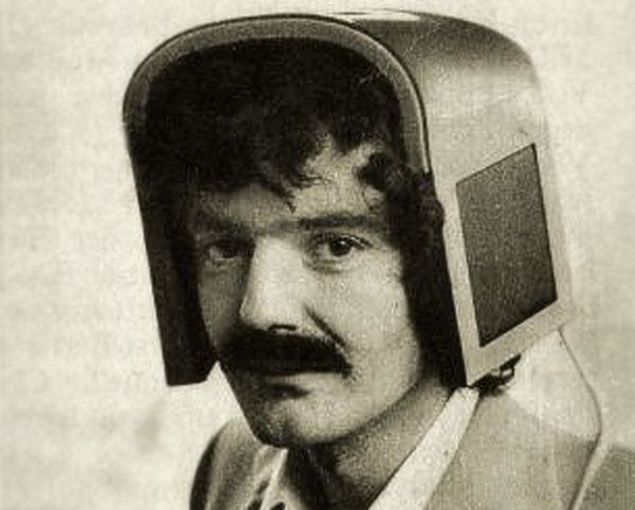
via Stereophile.com
Posted By: Alex - Tue Sep 12, 2017 -
Comments (3)
Category: Headgear, 1970s
The Tomorrow People

Combine The Mod Squad with The X-Men and you have The Tomorrow People.
Wikipedia page here.
Posted By: Paul - Wed Sep 06, 2017 -
Comments (3)
Category: Human Marvels, Television, Comics, Science Fiction, 1970s, Europe, Differently Abled, Handicapped, Challenged, and Otherwise Atypical
Davis Caves
Back in 1976, Andy Davis of Armington, Illinois decided to dig a cave in the side of a hill and live there with his family, to avoid high heating bills. In the process, he became a pioneer of the "earth-sheltered home" movement, and he went on to start a company building other "cave homes."Andy died in 1995, but his company still seems to be in business.

Bloomington Pantagraph - Jun 28, 1976

Image source: Mother Earth News

The Davis Cave, a pamphlet by Andy Davis
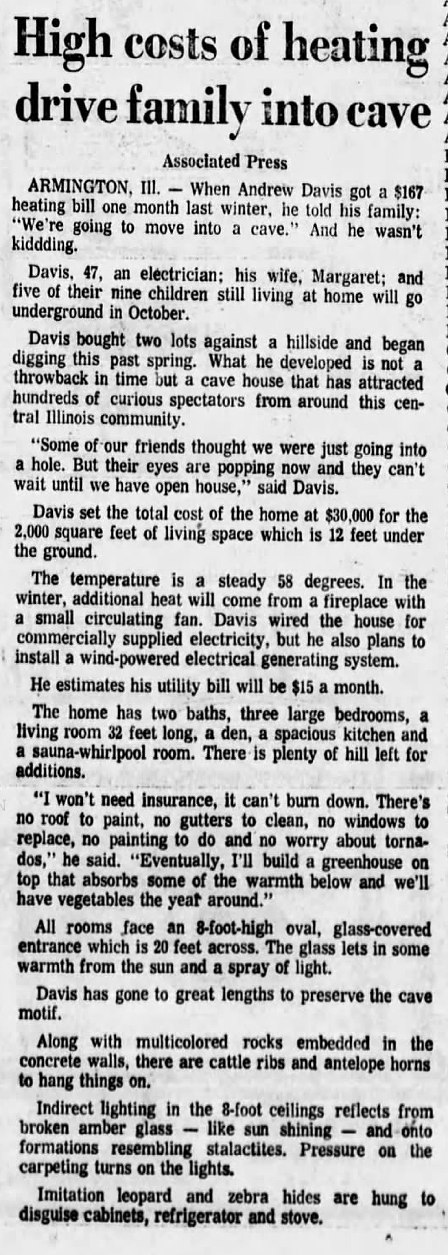
Arizona Republic - July 25, 1976
Posted By: Alex - Tue Sep 05, 2017 -
Comments (1)
Category: Buildings and Other Structures, 1970s
Aviary
A little additional info.
Posted By: Paul - Wed Aug 23, 2017 -
Comments (0)
Category: Excess, Overkill, Hyperbole and Too Much Is Not Enough, Music, 1970s
Concha Consciousness
Created in 1977 by Mr. X, and his partner Mr. Y, both of whom wanted to stay anonymous because they had "straight jobs in large corporations."Concha-Consciousness consisted of genuine conch sells worn as a headset. "Slipped onto the head, the C-C is supposed to shut out nagging spouses, yelping dogs, screaming kids, the TV, and traffic noises. It's supposed to give you 'time out for a little serenity.'"
The first ad for Concha-Consciousness appeared in the New Yorker on Sept. 26, 1977. The headsets were subsequently featured on The Today Show.
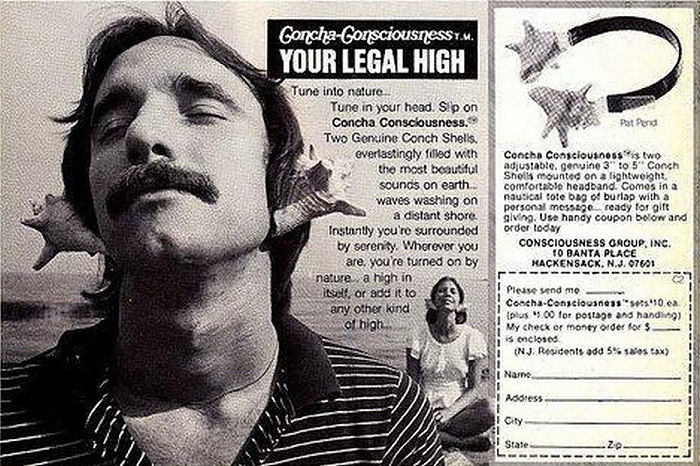
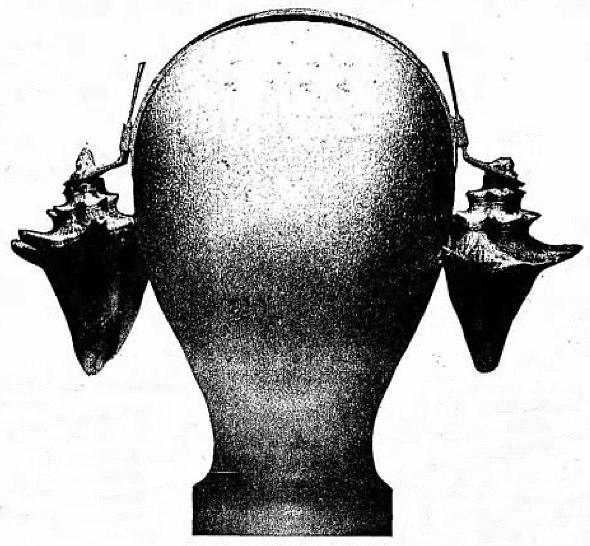
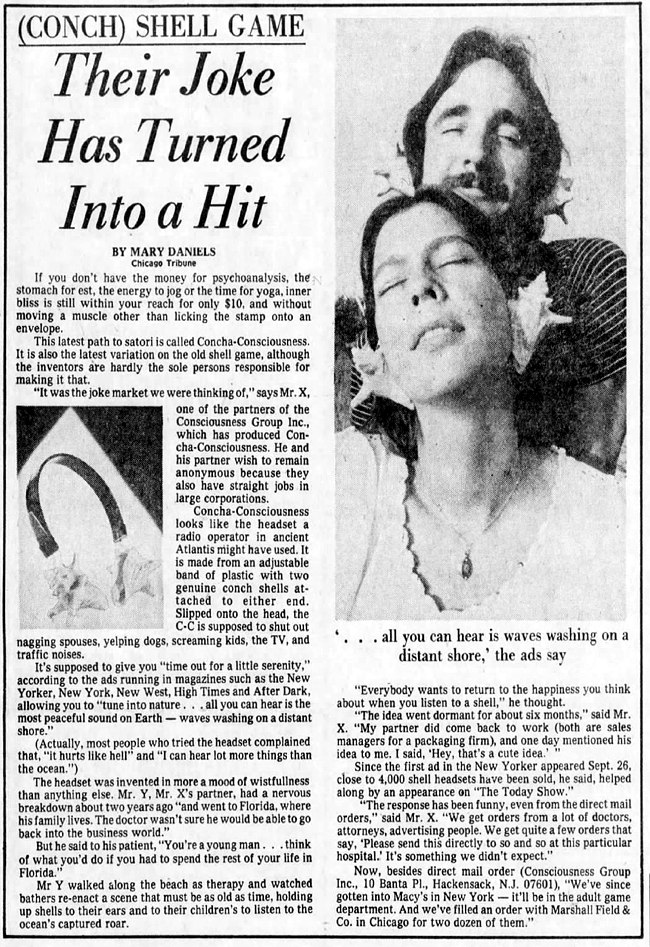
Detroit Free Press - Dec 23, 1977
Posted By: Alex - Tue Aug 22, 2017 -
Comments (0)
Category: Headgear, 1970s
The X-Rated Hypnotist

In the 1970s, hypnotist Charles Lamont got the idea of promoting himself as an "x-rated hypnotist." He kept this up until the 80s. But what exactly did this involve? Below is the only description of his act that I could find:
The crowd, including those who volunteered to be hyponotized, loved the act. Apparently the only one disgruntled was a fellow who sort of went under by accident and turned out to be the best subject of the second show.
When his friends told him what kind of fool he had been, he got angry and stormed out of the club.
But first he let Lamont know he wasn't pleased to have hugged and nuzzled the gentleman sitting next to him on the stage, a gentleman he had been led to believe was a beautiful young lady. Or to have fondled in public a foam rubber appendage he thought was real.
But the dignified, bearded fellow we first met seemed quite happy when he was done. Maybe nobody told him about his antics.
At Lamont's suggestion, he: told the girl sitting next to him his name was, um, something you say when you're asking for a sexual kick; drank a glass of water he thought tasted like urine (and quickly spit out); thought the young lady next to him was naked (and smiled widely).
And the clincher. Lamont told him to imagine he was both male Japanese samurai and his horny female sweetheart. Oh the moaning, oh the gestures, oh the intensity.
Another fellow in the first show was told that everyone in the house was having an orgy. He watched, smiled and shook his head in amazement.
But Lamont soon snapped his fingers and that fantasy ended. Another suggestion may last longer. Lamont told him he'll want to make love to his wife till the sun comes up — every Tuesday night from then on.
Near the end of the first show, which turned out to be the better even though there were more volunteers for the secon, all three of the men were told they were musclemen. Oh how they strutted. Then they were told they were gays on Fire Island. They strutted again, but somewhat differently.
One guy was told to take a drag off a cigarette. It would be the best joint of marijuana imaginable. He flew quite high until Lamont snapped his fingers and told him to go back to sleep...
The girls, including a chesty lovely who was "almost wearing" a striking dress, according to Lamont, were given less lively roles. (Among both sexes thre were some who didn't "go under." Lamont worked around them.)
"You have to go easy with the girls in the first show," said Lamont after that one. "Their boyfriends might get mad, things like that."
But the female volunteers weren't much more active in the second show. Mostly they served as straight men, so to speak, for the guy who later was sorry about the whole thing.
-Wilmington Morning News - Oct 7, 1979

Kingston Daily Freeman - Jun 12, 1962
Posted By: Alex - Fri Aug 11, 2017 -
Comments (4)
Category: Entertainment, Hypnotism, Mesmerism and Mind Control, 1970s

| Who We Are |
|---|
| Alex Boese Alex is the creator and curator of the Museum of Hoaxes. He's also the author of various weird, non-fiction, science-themed books such as Elephants on Acid and Psychedelic Apes. Paul Di Filippo Paul has been paid to put weird ideas into fictional form for over thirty years, in his career as a noted science fiction writer. He has recently begun blogging on many curious topics with three fellow writers at The Inferior 4+1. Contact Us |




